
'Le Rire Rouge'

a French Humor Magazine Goes to War
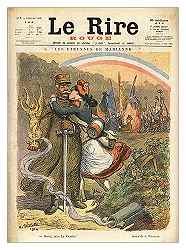
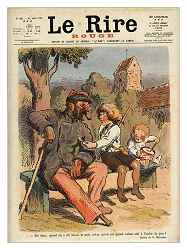
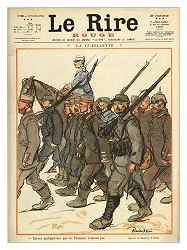
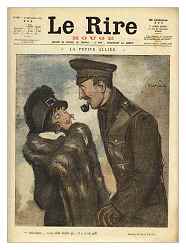
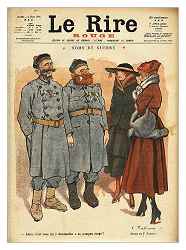
several war-time covers - see links for more
'Le Rire' (the Laugh) was a long existing and very successful French humor magazine. Like many other such magazines printed and edited in Paris it followed the proven formula of being graphically appealing by offering many large and colorful illustrations commissioned by the most gifted commericial artists of the day, along with a multitude of cartoons, jokes, short stories and pages of personal ads. It was not quite as saucy as other publications such as 'La Vie Parisienne' or 'Le Sourire'.
Upon outbreak of war in August 1914, 'Le Rire' along with many other French periodicals, ceased publication for a while, thereafter reappearing with somewhat altered contents. In the case of 'Le Rire', war-time issues were renumbered starting with number 1 and the name was changed into 'Le Rire Rouge' (The Red Laugh), the color 'red' most likely being symbolic of the blood of the soldiers of France, shed in defense of the country. 'Le Rire Rouge' also changed policy in regards to contents, almost all illustrations having to do with the war in some manner or other. Decidedly, it was a fiercely patriotic publication, if not one tempered by a comradely egalitarian admiration and gratitude for the courage and bravery of the soldiers of the Republic, the poilus of France. The common soldier became the true hero in the war-time pages of 'Le Rire Rouge', gifted with good cheer, a dogged determination to see things through and more common sense than all the politicians of the Assemblée, or the whole world for that matter, put together.
The cover pages were especially eye-catching, with color work done by a varied number of talented illustrators such as Fabiano, Ricardo Flores, Louis Icart, Guillaume, Willette, Meunier, Leandre and many others. Back pages were also very colorful with large-sized illustrations. Examples of both are given in the links section.
And yet, though undisputedly patriotic to the core, 'Le Rire Rouge' was not vindicative or hateful towards the German enemy. Political cartoons were usually aimed at the perceived wickedness of the ruling political elite, the Kaiser and his ministers being favorites, though long-winded French politicians found little favor as well. The common German soldier was usually depicted as being bad off, but essentially just another poor fellow doing his patriotic duty, someone who would rather be home than fighting a war.


'Le poilu de France' : the undisputed hero and favorite of 'le Rire Rouge'
To a Collection of Covers and Pages